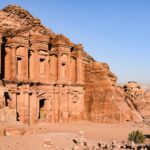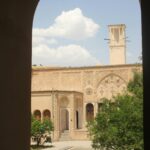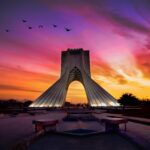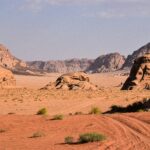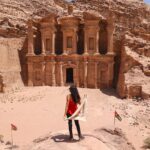![12 Best Things To Do In Rabat [2024] 6 Best Things To Do In Rabat](https://artandthensome.com/wp-content/uploads/2023/07/277596127_489893172614642_7720255391658944422_n-1024x1024.jpg)
Located on the Atlantic coast, Rabat is the political and administrative capital of Morocco, and the second largest city in the kingdom. Imperial city listed in 2013 as a UNESCO World Heritage Site, it was founded in the 12th century by the great Almohad sultan “Abd al Moumen”. At the beginning of the 20th century, it was only to a small town of 25,000 inhabitants.
Benefiting from an oceanic climate, here the thermometer rarely exceeds 25° C during the summer, which makes it an ideal city to visit . But Rabat is also a striking contrast: that of an urban and trendy metropolis displaying an impressive list of monuments, cultural and heritage sites that will be very pleasant to contemplate.
Wondering what to do in Rabat during your stay?
Here are 12 Best Things To Do In Rabat
Table of Contents
1. The Kasbah of the Oudaias
![12 Best Things To Do In Rabat [2024] 7 The Kasbah Of The Oudaias In Rabat](https://artandthensome.com/wp-content/uploads/2023/07/casas-azules-Rabat-768x513-1.jpeg)
The Kasbah of the Oudaias is a former fortified military camp, built in the 12th century, now listed on the UNESCO World Heritage List. In particular, there is one of the first palaces built by the Alawites, the royal dynasty, still reigning today.
After having entered the kasbah by one of the massive gates acting as grandiose guardians of the place, one lets oneself be captivated by the small bluish alleys with the walls covered with lime, the astonishing silence contrasting with the frenzy of the modern city center and the reigning tranquility. in the place. Many guides will help you understand this place steeped in history: if you don’t know what to do in Rabat, don’t hesitate, go to the kasbah.
2. National Zoo Rabat
![12 Best Things To Do In Rabat [2024] 8 National Zoo Rabat](https://artandthensome.com/wp-content/uploads/2023/07/277150484_1862231760629194_3379750432374264251_n-1024x1024.jpg)
The National Zoological Garden in Rabat is a popular place not to be missed when you come to visit Rabat: it holds the largest number of Atlas lions in captivity, and forms an artificial biotope sheltering more than 130 animal species native to the Atlas mountains , the typical desert of North Africa as well as the savannah. An essential visit for the family!
3. The Museum of History and Civilizations
![12 Best Things To Do In Rabat [2024] 9 The Museum Of History And Civilizations In Rabat](https://artandthensome.com/wp-content/uploads/2023/07/252152272_272728794780783_5509897572566523879_n-1024x1024.jpg)
Formerly known as the “Archaeological Museum”, the Museum of History and Civilizations bears witness to the rich history of Morocco from prehistory to the Islamic era, and presents ancient objects from excavations, as well as descriptions extremely detailed images of the ancestral way of life of the tribes of the Maghreb. For a small sum, you will be able to admire the tools of prehistoric men, statuettes from the Neolithic era, such as Roman deities, or ceramics, vestiges of the Dawn of the Muslim era; the bronze busts of Juba II and the great Cato, the famous statue of the crowned ephebe, or even the dog of Volubilis.
4. St. Peter’s Cathedral
![12 Best Things To Do In Rabat [2024] 10 St. Peter'S Cathedral In Rabat](https://artandthensome.com/wp-content/uploads/2023/07/271283852_4813405432086854_8174617798946994158_n-819x1024.jpg)
Built in 1930 in the Hassan district, on Golan Square, St. Peter’s Cathedral is the seat of the Archdiocese of Rabat; Morocco has always seen the different religions of the Book cohabit in peace, and it is therefore quite naturally that Christian and Jewish religious buildings found their place within it. What is more surprising is to visit Rabat and come across a cathedral built in the purest Art Deco style: its very particular geometric shape and its immaculate whiteness are reminiscent of snow crystals! It is possible to visit it, and the interior is just as surprising.
5. Garden of botanical tests
![12 Best Things To Do In Rabat [2024] 11 Garden Of Botanical Tests In Rabat](https://artandthensome.com/wp-content/uploads/2023/07/278876412_2024985131007084_6909459933581880719_n-1024x1024.jpg)
Created on the initiative of Marshal Lyautey in 1914, the purpose of the Garden of Botanical Trials was to highlight more than 250 fruit trees and ornamental plants from various regions of the world.
Today, this ecological micro-system in the heart of the city is home to an impressive collection of cacti and it is fun to come across many birds that have come to take shelter in the trees bordering the shaded paths of the park! Although it is never very hot in this Moroccan city, thanks to the presence of the nearby ocean, it is nevertheless pleasant to take advantage of a walk in all serenity in the green alleys of the park; a must for those who are still looking for what to do in Rabat.
6. The souk of Rabat
![12 Best Things To Do In Rabat [2024] 12 The Souk Of Rabat](https://artandthensome.com/wp-content/uploads/2023/07/souk-1024x681.webp)
The main souk is located on the rue des Consuls and leads to the Kasbah of the Oudayas; it serves as a significant stopover when you come to visit Rabat! It extends over more than a kilometer and, important detail that will appeal to the most dazed: the absence of winding streets will prevent them from getting lost as in that of Marrakech, for example, where dozens of tourists are struggling to find their way. !
7. Maamora forest
![12 Best Things To Do In Rabat [2024] 13 Maamora Forest In Rabat](https://artandthensome.com/wp-content/uploads/2023/07/IMG_6918.jpg)
Between Rabat and Kenitra, on a plateau stretching from the ocean up to 80 km inland, lies the 133,000 hectares of Maamora forest: the first cork oak forest in the world. It is the green lung of a green capital. It is an exceptional place for walking and hiking.
8. Garden of Hassan Tower
![12 Best Things To Do In Rabat [2024] 14 Garden Of Hassan Tower In Rabat](https://artandthensome.com/wp-content/uploads/2023/07/dsc02214.webp)
Walking along Bouregreg from Oudayas we reach, after having climbed the “ramp”, the gardens of Hassan Tower. Open since 2003, these gardens are now the meeting place for the families of Rabat, in front of Bouregreg and near ponds and fountains. From this peaceful and beautifully flowered garden throughout the year, you will have a superb view on the last loop of Bouregreg, the Kasbah of Oudayas and the medina of Salé.
9. Hassan II Park
![12 Best Things To Do In Rabat [2024] 15 Hassan Ii Park](https://artandthensome.com/wp-content/uploads/2023/07/parc-hassan-2.jpg)
Hassan II Park is located near Bab Zaer intersection between Imam Malik Avenue and Mohammed VI Avenue, on a total area of 20 Ha. This park consists of several spaces and sports fields including: fields of football, basketball and volleyball as well as a climbing wall. There is also a musical fountain, a play area, and walkways.
10. Dayet Erroumi
![12 Best Things To Do In Rabat [2024] 16 Dayet Erroumi In Rabat](https://artandthensome.com/wp-content/uploads/2023/07/Screenshot_20211201-164430_Maps-1024x771.jpg)
Located 15 km from the town of Khémisset, a road in the wilderness leads you to the peaceful waters of Dayet Erroumi. A 15 to 20 meter-deep natural lake, where the blue color of the sky is reflected, a true invitation to serenity. A unique setting where everyone can choose an activity by the water, walk around the lake, fish or have a picnic with family or friends.
11. Sidi Boughaba
![12 Best Things To Do In Rabat [2024] 17 Sidi Boughaba](https://artandthensome.com/wp-content/uploads/2023/07/Lac_sidi-boughaba.jpg)
About thirty kilometers from Rabat towards Kenitra, the lake of Sidi Boughaba attracts migrant birds which find there a place of refuge and rest. This 4 km long-lake, together with the 450 hectares of forest and the hills that surround it constitute an important natural reserve, and one of the most beautiful sites of wild life of Morocco, where one can picnic, hike and, of course, practice bird-watching (205 bird species listed!) the biological reserve of Sidi Boughaba is established on Sidi Boughaba Lake, which is one of the main natural expanses of permanent freshwater on the Atlantic coast of Morocco. Located 35km to the north of Rabat, the reserve is a wetland of international importance for migratory water birds.
12. Exotic gardens of Bouknadel
![12 Best Things To Do In Rabat [2024] 18 Exotic Gardens Of Bouknadel Near Rabat](https://artandthensome.com/wp-content/uploads/2023/07/jardins_exotiques_1-min-1024x535.jpg)
Some green again with exotic Bouknadel gardens 20 km from Rabat, on the road to Kenitra. Dedicated to plants from all over the world, it offers five educational circuits to learn about biodiversity, waste management and recycling, forests and soil protection, as well as water and ecological gardening. Created in 1952 by the French horticultural engineer Marcel François on an area of 4 and a half hectare, it houses several exotic plants imported from several countries, you will find several types of places categorized as Polynesia, Congo, Mexico, South Asia, Peru, Brazil, West Indies, shrub Savannah, Green ravine. It is among the most beautiful gardens in Morocco, and you should definitely visit it and let yourself be carried away by its plants, sublime and bizarre at the same time. Several cultures are present in the gardens: Japanese, Chinese and Andalusian. You can find snakes, lizards, turtles, amphibians, scorpions, tarantulas, etc., in an unusual setting. The vivarium of Bouknadel Exotic Gardens invites the visitors to discover the secret life of reptiles, the strangeness of their habits and the variety of their species presented in conditions close to their natural environment.

